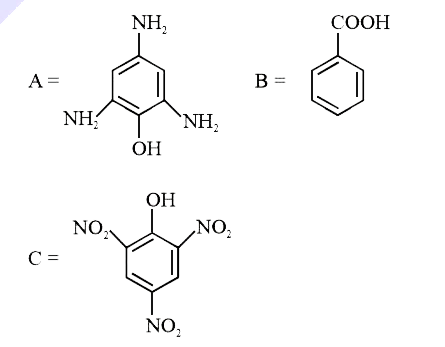When water is added to compound (A) of calcium, solution of compound (B) is formed. When carbon dioxide is passed into the solution, it turns milky due to the formation of compound (C). If excess of carbon dioxide is passed into the solution milkiness disappears due to the formation of compound (D). Identify the compounds A, B, C and D. Explain why the milkiness disappears in the last step.
The compound A is calcium oxide , CaO and B is calcium hydroxide , Ca(OH)2.
The compound C is calcium carbonate , CaCO3 and the compound D is calcium bicarbonate , Ca(HCO3)2. Calcium bicarbonate Ca(HCO3)2 is soluble in water and therefore , milkiness of solution disappears on passing excess of carbon dioxide into the solution .
Ca(OH)2+CO2→CaCO3(Milkiness)+H2O
CaCO3+CO2+H2O→Ca(HCO3)2soluble(Milkiness disappears)
Topper's Solved these Questions
- BOOK - MODERN PUBLICATIONCHAPTER - S-BLOCK ELEMENTS ( ALKALI AND ALKALINE EARTH METALS ) EXERCISE - PRACTICE PROBLEM24videos
S-BLOCK ELEMENTS ( ALKALI AND ALKALINE EARTH METALS )
- BOOK - MODERN PUBLICATIONCHAPTER - S-BLOCK ELEMENTS ( ALKALI AND ALKALINE EARTH METALS ) EXERCISE - Conceptual Question 122videos
S-BLOCK ELEMENTS ( ALKALI AND ALKALINE EARTH METALS )
- BOOK - MODERN PUBLICATIONCHAPTER - REDOX REACTIONS EXERCISE - COMPETITION FILE (Objective Questions) (C. MULTIPLE CHOICE QUESTIONS)9videos
REDOX REACTIONS
- BOOK - MODERN PUBLICATIONCHAPTER - SOME BASIC CONCEPTS OF CHEMISTRY EXERCISE - COMPETITION FILE (INTEGER TYPE AND NUMERICAL VALUE TYPE QUESTIONS)10videos
SOME BASIC CONCEPTS OF CHEMISTRY
Similar Questions
Fill in the blanks in the following statements:
When carbon dioxide is passed through lime water, it turns milky due to the formation of ______.View SolutionFill in the following blanks with suitable words :
When carbon dioxide is passed through lime water. It turns milky due to the formation of ______.View Solution
Knowledge Check
- Question 1 - Select One
When carbon dioxide is passed . through clear lime water solution then it turns milky. The milky appearance of lime water is due to
Acurdling of milk due to lime in waterBpresence of impurities in lime waterCpresence of Insoluble calcium carbonateDpresence of soluble calcium carbonate - Question 2 - Select One
When carbon dioxide is passed through clear lime water solution, it turns milky. The milky appearance of lime water is due to
APresence of impurities in lime waterBPresence of insoluble calcium carbonateCPresence of soluble calcium carbonateDCurdling of milk due to lime in lime water - Question 3 - Select One
When carbon dioxide is passed through clear lime water solution then it turns milky, The milky appearance of lime water is due to
Acurdling of milk due to lime in waterBpresence of impurities in lime waterCpresence of insoluble calcium carbonateDpresence of soluble calcium carbonate
What is the nature of the solution obtained when carbon dioxide gas is passed into water ?
View SolutionWhen carbon dioxide is passed through lime water, the solution turns milky, but, on prolonged passage, the solution turns clear. This is because
View SolutionWhen carbon dioxide is passed through lime water, a milky white precipitate of ___________is formed.
View SolutionWhy does the milkiness disappear on passing excess of carbon dioxide to lime water ?
View SolutionCompound(s) which will liberate carbon dioxide with sodium bicarbonate solution is/are:
 View Solution
View Solution

